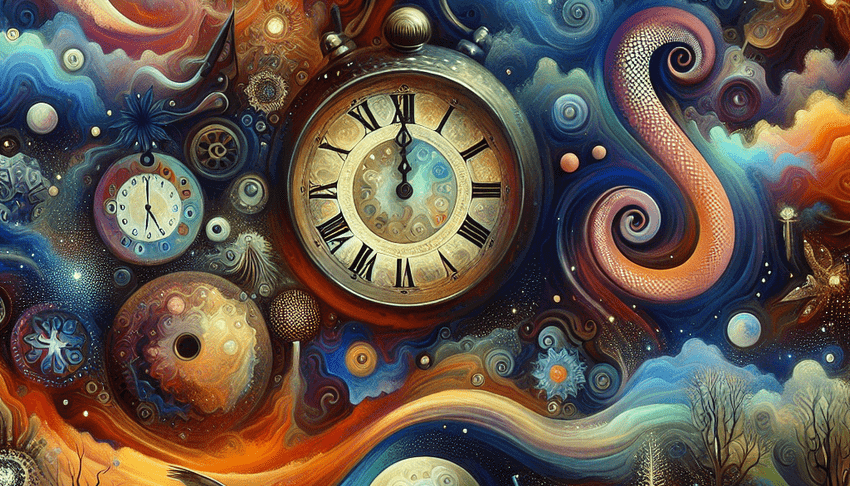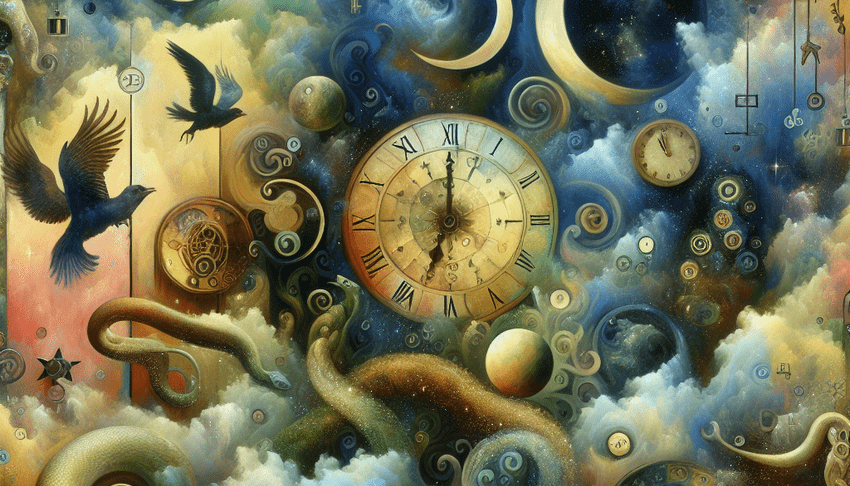Table of Contents
The Psychological Underpinnings of Falling Dreams

The Manifestation of Anxiety and Stress
Understanding the plunges of our subconscious often mirrors the tumultuous emotional states we navigate in our waking lives. Falling dreams are particularly emblematic of this phenomenon, exemplifying how our innermost fears and anxieties can manifest as vivid and sometimes jarring dream experiences. Dream interpretation, particularly of falling meanings, provides a fascinating lens through which we can decipher these nocturnal narratives.
Dream Interpretation and Anxious Minds
Interpreting dreams is as much an art as it is a science. The act of falling in a dream frequently symbolizes a lack of control or a fear of failure in one’s life. When we look at falling dreams more deeply, we often find underlying themes of insecurity or a perceived inability to meet life’s challenges. Academic research supports the idea that falling dreams are correlated with life’s stressors, both big and small. These stressors could range from major life transitions to everyday concerns about work or personal relationships.
- Job insecurity leading to recurring nightmares of falling off a crumbling cliff.
- A relationship at the brink of collapse, mirrored by dreams of plummeting from great heights.
- The fear of failing an important exam manifesting as a sequence of dropping through endless space.
Symbolism of Falling: A Dive into the Unknown
The symbolism of falling in dreams can be dissected from multiple angles. Psychologically, it shines a spotlight on Emotionale Intelligenz—the ability to understand and manage one’s own emotions. When individuals possess heightened self-awareness, they are more adept at identifying the sources of their falling dreams, granting them a crucial starting point for personal development.
Moreover, falling can signify a release from the lofty pressures of daily existence, symbolizing an unanticipated dive into the unknown. It is not uncommon for these dreams to occur when we find ourselves at a crossroads, faced with decisions that could significantly alter the course of our lives. At its core, a dream of falling can be a call to action—a subconscious nudge towards acknowledging and addressing the stress and anxiety that permeate one’s waking reality.
- Sudden job changes prompting dreams about free-falling into an abyss.
- An unexpected loss leading to nightly visions of a descent into darkness.
- An unresolved argument causing the feeling of dropping in a bottomless well in dreams.
Falling dreams allow us to examine our emotional scaffolding, revealing both vulnerabilities and strengths. By exploring these dreams through dream interpretation, we not only confront the falling meanings but are also provided with a unique opportunity for emotional growth. As we decode these symbols, we gain insights that can lead to a more grounded and serene waking life, converting yesterday’s nightmares into today’s stepping stones for mental resilience.
Emotional Reactions and Personal Growth
Dreams of falling are a common phenomenon that many people experience, eliciting visceral emotional reactions that range from terror to exhilaration. On exploring these dreams through the lens of dream interpretation, one can gain insights into their emotional world and potentially catalyze personal growth. But what can these falling dreams tell us about our current emotional states or potential for developing Emotional Intelligence?
One widely accepted interpretation of falling dreams suggests that they reflect a sense of loss of control or fear of failure in one’s waking life. For example, if you’re facing significant changes at work or in personal relationships, a dream in which you’re falling might signify anxiety about the unknown or a feeling of instability.
To understand the symbolism of falling in dreams further, consider the specific context of the fall. Are you falling into darkness, which might symbolize fear and the unknown, or is it a fall into water, which could represent cleansing and emotional release? The nuances of each dream are critical to unraveling their meanings.
The Emotional Impact of Falling Dreams
When interpreting the emotional impact of falling dreams on personal growth, it’s helpful to view them as a call to action. They are often thought to be a manifestation of our subconscious minds signaling that something in our lives is amiss. Reflecting on the details of such dreams can increase self-awareness and underline areas in our lives that may require attention or change.
For instance, someone who frequently experiences falling dreams might need to consider areas where they feel unsupported or insecure. Addressing these concerns can lead to better Emotional Intelligence as one learns to manage their emotions related to these fears effectively.
The Role of Emotional Intelligence in Interpreting Dreams
Emotional Intelligence (EI) plays a pivotal role in interpreting our dreams. It involves understanding our own emotions, the emotions of others, and using this emotional awareness to guide our thoughts and actions. When we apply EI to dream interpretation, we obtain a rich, personalized understanding of our emotional responses to dreams of falling.
By analyzing these dreams, we can practice EI by identifying the emotions that arise and exploring their sources. This approach can lead to improved emotional regulation and a greater capacity for empathy, as we may begin to understand how our fears and insecurities can impact our behavior towards others.
In practice, someone adept at using EI when examining their falling dreams might find they are more prepared to handle real-life situations that trigger similar emotions. For example, if falling dreams are connected to a fear of letting people down, this person can work on building more robust support systems in their social or professional circles, minimizing the impact of such fears.
Promoting Emotional Growth Through Dream Analysis
Examining our responses to falling dreams can serve as a powerful tool for emotional growth. It encourages us to confront our fears and insecurities directly, which is a crucial step toward building resilience and establishing a more balanced emotional life.
By integrating dream interpretation into personal development practices, we develop the capacity to use our nighttime narratives as a guide. Not only do we improve our understanding of ourselves, but we also lay the groundwork for enhanced interpersonal relationships and a more empathetic approach to life.
In summary, falling dreams are not just mere figments of our imagination but potent symbols that, if interpreted with Emotional Intelligence, hold the potential to foster significant personal growth and an enriched emotional life. As we embrace the power of dream interpretation and symbolism, we unlock the door to deeper self-awareness and the continual development of our Emotional Intelligence.
Cultural and Historical Perspectives on Falling Dreams

Cultural and Historical Perspectives on Falling Dreams
Dream interpretation and symbolism offer a fascinating glimpse into the subconscious mind, and among the myriad dream scenarios people report, falling dreams are one of the most common. These dreams can evoke a strong sense of emotion and are often vividly remembered upon waking. But what do such dreams mean, and how do they vary across cultures?
Cross-Cultural Symbolism of Falling Dreams
Dream interpretation has ancient roots that spread across various cultures, and falling dreams are interpreted in diverse ways. To begin with, many cultures view dreams of falling as indicative of fear or anxiety, often linked with a loss of control or fear of failure. This interpretation resonates with the psychological perspective, which sees falling dreams as a manifestation of insecurity or instability in one’s life.
- In Western cultures, falling in dreams often symbolizes a lack of balance or upheaval. Feeling out of control or overwhelmed might manifest as a dream of falling, representing a subconscious processing of life’s challenges.
- Conversely, in some Native American traditions, falling dreams have been seen as a sign of passing a certain test or rite of passage, suggesting a different kind of symbolic fall—a descent into a new level of awareness or understanding.
- In Chinese interpretations, the meaning of falling dreams can vary. Sometimes, these dreams are thought to warn against personal or financial risk-taking. In the Chinese Zodiac, each year is represented by an animal symbol with its own traits, and falling dreams might be interpreted differently depending on the year’s animal.
The symbolism of falling in a dream can also be influenced by the environment in which one falls. For instance, falling into water might be associated with emotional cleansing or revival, while falling into an abyss could signify fear of the unknown or deep-seated anxieties.
Academic Research and Falling Meanings
Academic studies have delved into the psychological underpinnings of falling dreams. Researchers propose that such dreams reflect a primal instinct related to our evolutionary history. The sensation of falling might be linked to the reflex that causes a sudden jolt, known as a hypnic jerk, when falling asleep—a throwback to our ancestors who slept in trees and needed to awaken quickly to prevent a fall.
Further research correlates falling dreams with real-life stressors, suggesting that these dreams serve as a coping mechanism. They allow individuals to rehearse dealing with fear and anxiety in a safe environment—the dream world. This encounter with fear may help one to build Emotional Intelligence and resilience.
By understanding the cross-cultural interpretations and underlying psychological theories, we gain greater insight into falling dreams. This knowledge does not only satiate our curiosity about such enigmatic experiences but also sheds light on the universal and individual aspects of the human psyche.
In conclusion, despite variations across cultures, falling dreams often reflect common human concerns and emotions. It’s important to remember that the dream world is deeply personal, and while cultural symbolism and academic research can guide interpretation, the unique emotions, and experiences of the individual dreamer must always be taken into account.
Historical Interpretations and Evolution of Meaning
Dream interpretation, a practice as old as civilization itself, has long fascinated scholars and laypeople alike. The enigmatic nature of dreams invites a plethora of interpretations, particularly when it comes to the panicky sensation of falling. In this section, we’ll explore the historical interpretations and evolution of meaning surrounding falling dreams.
Ancient civilizations such as the Egyptians and Greeks viewed dreams as divine messages. Falling dreams were often seen as omens or warnings from the gods about potential danger or misfortune. The famous Artemidorus of Daldis, a Greek professional dream interpreter in the 2nd century AD, posited that falling dreams could signify a loss of status or a forthcoming failure.
As we progressed through the ages, the lens through which we viewed falling dreams shifted. During the Middle Ages, dreams, including those of falling, were often thought to be temptations or deceptions planted by demons. This ominous view kept many wary of the messages contained in their nighttime visions.
The advent of psychoanalytic theories, particularly those of Sigmund Freud and Carl Jung, brought a revolutionary perspective on dream interpretation in the late 19th and early 20th centuries. For Freud, falling dreams could symbolize anxieties surrounding a loss of control, or even repressed sexual impulses. Carl Jung, on the other hand, saw falling dreams as a symbol of the dreamer’s state of being, perhaps reflecting a sudden jolt to one’s self-esteem or to one’s life foundations.
- Falling dreams and their nuances became a topic of great interest within psychodynamic circles.
- Dream interpretation took on a more personal, introspective approach, focusing on the subconscious messages about the dreamer’s own mental and emotional states.
- Falling meanings have evolved to include fears of failure, feeling overwhelmed, or even a subconscious desire to let go of certain aspects of one’s life.
Falling dreams have a rich historical context, transformed across epochs and ideologies. Modern psychology continues to study them, using quantitative data and empirical evidence to understand the universality and individual variations of these experiences.
Falling dreams, while often distressing, are not uncommon and can be a reflection of various psychological states. Today, dream interpretation remains an inexact science, yet it stands as a testament to our enduring desire to understand the hidden facets of our minds. Understanding the historical context and symbolism of falling dreams can aid individuals in their personal mental development, providing clues to their innermost fears, desires, and unresolved conflicts.
Summary
The sensations we often encounter in the realm of sleep, particularly when it involves falling, are reflective of the deep emotional undercurrents that persist in our daily lives. The interpretation of falling dreams provides a unique and critical vantage point for exploring the subconscious mind, underscoring fears and insecurities that might otherwise go unrecognized. These nightly narratives can serve as signals, prompting us to address the stress and anxiety that may be influencing our waking existence.
Dreams of falling typically imply a loss of control or a fear of impending failure, something that many individuals can relate to. Life’s stressors, both explicit and implicit, can find themselves manifested in dreams as uncontrollable descents, linking our dream world with our real-life concerns about work, relationships, or our own personal pressures.
Dream Interpretation: An Insight into Our Subconscious
Interpreting dreams goes beyond mere speculation; it is informed by psychological studies and academic research. Falling dreams, for one, have been correlated with significant stressors in life—from dramatic changes such as job transitions to the more nuanced worries about personal achievements.
- Feeling insecure at work might translate to dreams of tumbling off a sheer cliff edge.
- Rocky relationship dynamics may be played out as free-falls in dreams, reflecting emotional unrest.
- The anxiety over an upcoming test could find one dropping through empty space in their dreams.
Within these nocturnal falls lies a treasure trove of symbolism. They can be interpreted as a call to examine and re-evaluate one’s emotional intelligence, self-awareness, and resilience. Falling dreams may also symbolize the need to release from high daily pressures, acting as a subconscious nudge to welcome the unexpected and embrace the unknown.
- Significant personal shifts may be foreshadowed by dreams of free-falling, urging one to brace for what’s ahead.
- The experience of loss could lead to persistent dreams of descent, pointing to the need for emotional processing and recovery.
- Dreams of falling down a bottomless well might arise from unresolved conflicts, suggesting the subconscious desire to find resolve.
Understanding the Psychological Dimensions
The anxiety that accompanies falling dreams reflects our instinctual fear of losing control or support. This lack of stability in our lives, whether perceived or real, can trigger these intense dreams.
- Career challenges or instability can elicit dreams of falling, symbolizing the fear of an unsteady professional future.
- Personal insecurities, whether about our abilities or worth, may be represented by falling scenarios in our dreams.
- Falling dreams might also emerge from the ups and downs of personal relationships, symbolizing the need to address emotional uncertainty.
A Universal Phenomenon Across Cultures
The interpretation of falling dreams spans cultures, each with unique perspectives on what such dreams signify. While Western cultures might infer falling as a loss of balance or control, some Native American traditions view them as important rites of passage. For instance, the Chinese might see these dreams as a caution against risk.
Cultural and Psychological Insights
Academic research links falling dreams to evolution, suggesting a primal instinct developed to protect our ancestors from actual falls while sleeping in trees. Furthermore, such dreams might act as a coping mechanism, allowing individuals to confront fear in a safe setting and grow emotionally stronger from it.
Falling dreams, in all their distressing detail, are not unusual. By examining their symbolism and the historical evolution of their meanings, we can gain a deeper understanding of our inner lives. Understanding falling dreams can be a step towards personal growth, shedding light on our deepest fears and unspoken desires. Embrace their messages and let them guide you through your emotional landscape.
FAQ – Dreams About Falling: Interpretations
What are some potential meanings behind dreams about falling?
Dreams about falling often symbolize feelings of insecurity, loss of control, or anxiety about a situation in one’s waking life. They might reflect a fear of failure or an unwillingness to confront something that is perceived as overwhelming. In the journey of personal development, such dreams can provide insight into areas of our lives where we may feel vulnerable or unstable, prompting us to address these issues consciously.
What are some common interpretations for dreams about falling?
Dreams about falling commonly symbolize feelings of insecurity, loss of control, or fear of failure in one’s waking life. This theme may reflect an individual’s anxiety about not meeting expectations, whether their own or those of others. It often prompts dreamers to consider areas of their life where they might feel unstable or are facing a significant challenge that threatens their sense of balance or security.
What are some common interpretations of dreams about falling?
Dreams about falling often symbolize a sense of loss of control or insecurity in one’s life, perhaps in relation to one’s career, personal relationships, or self-esteem. This common dream theme may also reflect feelings of failure or an inferiority complex, where the dreamer is grappling with a fear of not meeting expectations—either their own or those of others. In practice, when interpreting such dreams, it’s essential to consider the specific context within one’s waking life, as the act of falling could also represent a subconscious desire to let go of something that has been holding them back.




